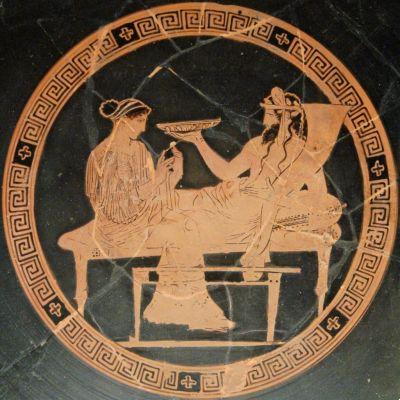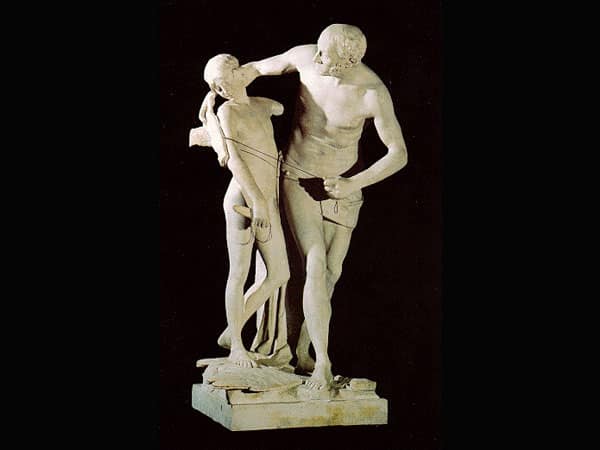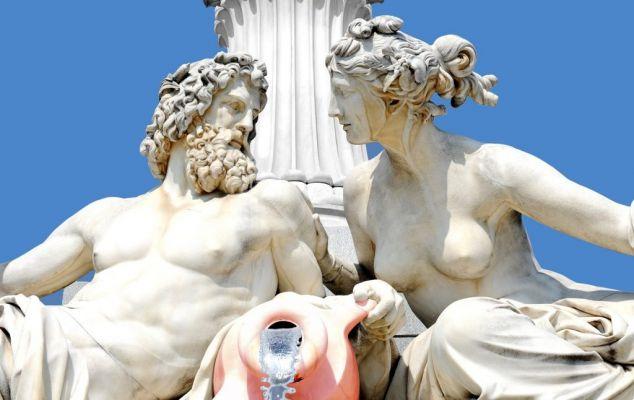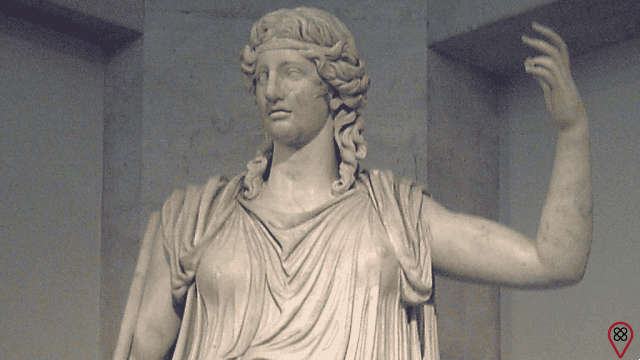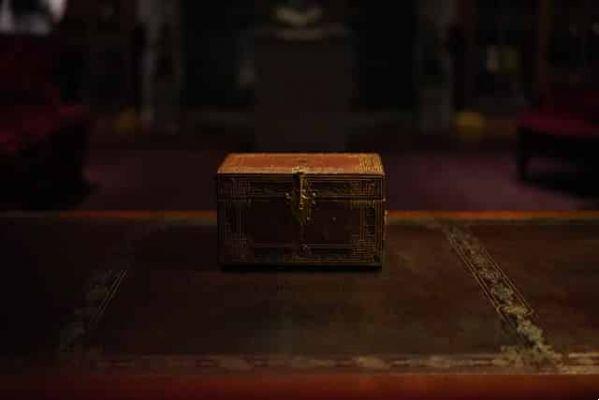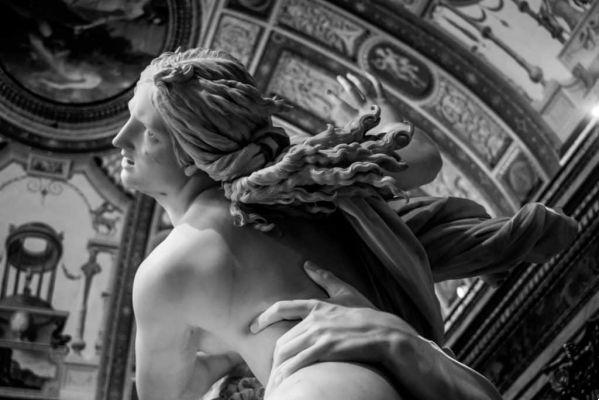In a movie, series or even a book, you must have already known a Greek myth. This type of story emerged in Ancient Greece and inspires different narratives to this day. So keep reading the article to know the main tales of Greek mythology!
Narcissus Myth
In “Sampa”, a song by Caetano Veloso, the phrase “It is that Narciso thinks what is not a mirror is ugly” describes very well the myth associated with this character. The son of the god Cephisus and the nymph Liriope has quite a story, which has everything to do with his own reflection.
When Narcissus was born, everyone noticed how beautiful he was. However, an oracle warned that Narcissus could never look at himself in a mirror, or see himself through any surface that reflected it, as that would be the young man's downfall.
As time passed, Narcissus attracted looks from men and women, he became arrogant and proud. Even so, Echo, a nymph, fell in love with him, but that love never materialized.
This is because Narcissus ended up disregarding the oracle's guidance and saw himself in the waters of a river. Immediately, he was so in love with himself that he stopped seeing everything around him. After that, he withered away where he was and turned into a flower when he died.
Myth from Medusa
Anyone who hears about Medusa already imagines a hideous and cruel creature, capable of turning anyone into stone. But where did that power come from? Why did this figure become so dangerous? The woman with snakes on her head wasn't always like that.
According to myth, Medusa was one of the priestesses of the temple of Athena, a Greek goddess married to Zeus, a Greek god. They had a good relationship, until the moment when Zeus harassed Medusa.
From that point on, Athena felt so angry at Medusa that she decided to transform her into a being that could never be loved and desired. In addition to having snakes on her head, Medusa would turn anyone who looked into her eyes to stone.
As a consequence of the cruelty of Zeus and Athena, Medusa came to be seen with fear, anger and contempt. They even used to paint the creature's face in temples to ward off evil spirits.
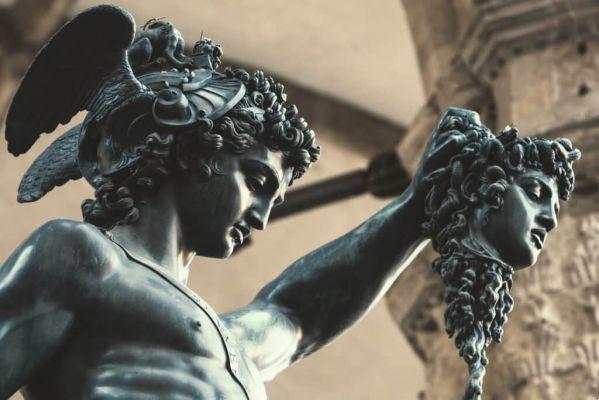
Myth of Pandora and her box
Pandora's box is almost as important as the one that names it. However, to understand where the relationship between this woman and the object comes from, we need to know a little more about how the Greek gods dealt with humans.
At first, only the gods had mastery of fire, and they were proud of it. Prometheus, humanity's titan ally, made the decision to steal this divine flame, so that humans too could thrive on Earth.
Angered, Zeus wanted revenge on Prometheus. For this, he asked Athena and Hephaestus to create Pandora. This woman would be the first to live among humans, and she was given a box before coming down to Earth. The object held all the evils of the world and hope, but that was a secret.
Zeus ordered Pandora to never open the box. Despite this, the woman could not resist curiosity and ended up unleashing all evils on humans. Quickly regretting it, she closed the box again, and only hope remained inside her.
Myth of Kronos, who devours his children
The image of a father devouring his own children seems completely absurd. Still, there is a Greek myth about it, which involves a mighty titan. He was called Cronos, the youngest son of Gaia and Uranus.
When Kronos realized that Gaia was suffering at the hands of Uranus, the young man arranged for his father's death. With his sister, Rhea, Kronos had several children, but he devoured each one of them in fear that he would be robbed of his throne.
Only one of Kronos' sons was not devoured, because he was protected by his mother: Zeus. With great courage, the god fought Kronos and forced him to vomit the children he had devoured.
After Zeus' victory over Kronos, the god became king of the other gods, maintaining himself as the sovereign ruler. In the end, Kronos was right to fear that his sons would end up stealing his place.
Myth of Prometheus
Prometheus is a name that has already been mentioned in this article, and you already know what he did. The theft of fire from the gods not only cost humanity dearly, but also the brave thief who accomplished this feat.
Son of Iapetus and Asia, Prometheus was one of the co-creators of humanity, that's why he was so attached to humans. With a remarkable ability to stand up to the gods and deceive them, Prometheus became a close friend of Zeus, who offered him the clay and water needed to create people.
However, Zeus realized that Prometheus had gotten closer to humans than he should have, and he began to feel jealous. The situation worsened when Prometheus stole fire from the gods for men, ensuring that they were sovereign over other animals.
As punishment for this betrayal, Zeus ordered Hephaestus to bind Prometheus in chains atop Mount Caucasus for 30 years. During this period, an eagle would devour the Titan's liver every day, as Prometheus' immortality guaranteed the organ's regeneration. Fortunately, Hercules freed the Titan from this punishment.
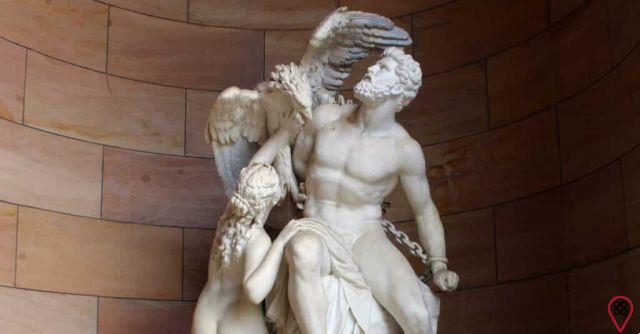
Achilles myth
Anyone who has heard the expression “Achilles heel” may not even know where it came from. That's why it's always good to learn more about the myth that gave rise to this very common term, which we use to talk about a weakness we have.
Achilles was a hero and demigod, the son of Peleus, a mortal, and Thetis, a nymph. Unfortunately, Peleus died when Achilles was still young. To ensure that her son developed well, Thetis entrusted the child to the care of Chiron, a centaur, who taught him to fight.
As Achilles grew up, an oracle warned that the Greeks would only win the Trojan War if the young man was fighting alongside them. Achilles' mother, worried, decided to hide him in Cyros, disguised as a woman. Furthermore, she bathed him in the River Styx, to make him immortal, holding him by the heels.
Despite all precautions, the Greeks eventually found Achilles, and he went to fight in the Trojan War. With a poisoned arrow from Pariah, however, Achilles' heel was hit. It was the only part of his body that was not protected by the waters of Styx, and the hero died as a result.
Myth of Persephone and the Seasons
As Greek mythology was developed to explain natural phenomena that had not yet been studied, there is a myth to understand the changing of the seasons, which relates to Persephone, goddess of the underworld.
Daughter of Zeus and Demeter, Persephone attracted the attention of many gods. One day, when she was picking daffodils, she was kidnapped by her uncle, Hades, who took her to the underworld. Immediately, the sadness of Demeter, goddess of agriculture, was reflected in lifeless crops.
While the gods were looking for Persephone, Hades offered her a pomegranate. Not knowing what the fruit's powers were, the young woman tasted it. As a consequence of this, she would be trapped in the underworld for a third of the year, being able to return to Olympus in the other months.
In this way, when Persephone needed to return to the underworld, winter and part of autumn happened, with Demeter destroying crops, due to all the sadness she felt. However, when she returned to Olympus, the other part of autumn, summer and spring manifested.
History of King Midas
What would your life be like if everything you touched turned to gold? You don't even have to imagine, because according to Greek mythology, this has already happened. And the lucky one (or not so lucky) was King Midas.
According to the story, Midas was the son of a peasant, Gordius, who was chosen to rule, as the population wanted to fulfill a prophecy. When the man died, Midas took his father's place, becoming king of Phrygia.
On one occasion, some peasants took a man to Midas, who was already very old and seemed to be lost. The king recognized that the man was Silenus, foster-father of Bacchus, god of wine, and took him to his son. In a gesture of gratitude, Bacchus granted Midas a request.
Greedy, Midas asked for the ability to turn everything he touched into gold. Although the gift looked perfect, all the food and drink Midas tried to ingest turned to metal, and the people he touched turned into statues.
So Midas asked Bacchus to release him from the curse. The god granted the request, saying that Midas only needed to bathe in a river. After that, the king began to reject riches and began to lead a simple life in the countryside.
Myth of Theseus and the Minotaur
The myth of Theseus and the Minotaur is a long story. To fully understand her, we need, first of all, to know a little more about these two characters. Theseus was a strong and courageous man, the son of Aegeus and Etra. On the other hand, Minotaur was a monstrous creature, trapped in a labyrinth. What does one have to do with the other?
When Theseus was born, Aegeus asked Etra to tell her who the young man's father was only if he managed to lift a stone, which was hiding some of Aegeus' belongings. Having accomplished the feat, Theseus set out for Athens to meet his father.
Arriving there, Aegeus was married to Medea, a sorceress who did not want a reunion between father and son to take place. So she asked Aegeus to poison Theseus. Fortunately, the young man had his father's belongings, who quickly recognized him. Afraid of the punishment he would receive, Medea fled.
The birth of Minotaur was also a bit troubled. His mother's husband, Minos, had made a wish on Poseidon. The Sea King said that he could help Minos as long as he killed a white bull that would appear on the island of Crete.
As soon as the white bull appeared, Minos was enchanted by the animal's beauty. Soon, he decided to sacrifice another bull, believing that Poseidon wouldn't notice the difference. But that's not what happened. Upon noticing the farce, Poseidon cast a curse on Minos, causing his wife, Pasiphae, to fall in love with the white bull.
The result of that love was the Minotaur. As he was a terrifying and monstrous being, Minos built a labyrinth to imprison him. Every year, 14 people went there to try to kill the creature. Everyone died on the job.
The only exception was Theseus. That's because, as soon as he arrived in the city where the labyrinth was built, he fell in love with Minos' daughter, Ariadne. The young woman offered the hero a ball of yarn, so that he could mark the way in the labyrinth, and a magic sword, to defeat the Minotaur. Everything worked!
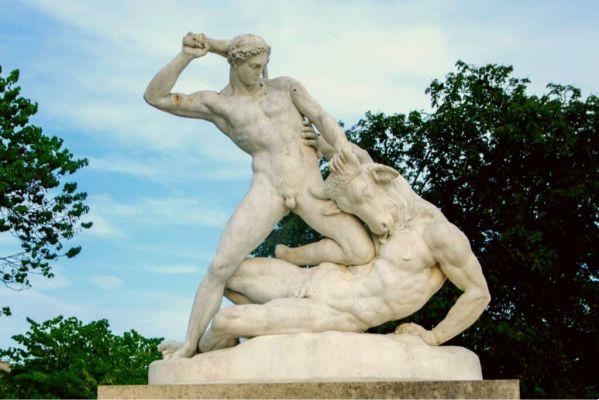
Myth of Icarus
The myth of Icarus is closely related to the myth of the Minotaur. The reason for this is that it was Icarus' father, Daedalus, who designed the labyrinth where the creature was trapped. However, he revealed the secret of the place to Ariadne. Minos didn't like this and decided to punish Daedalus by trapping him and his son inside the labyrinth.
Since Daedalus was a great engineer, he used gull feathers and beeswax to build wings for himself and his son. So they could fly out of the labyrinth. It was evident that this tool could only be used at that moment, in a life-or-death situation.
However, after Icarus and Daedalus regained their freedom, the engineer's son was delighted by the possibility of flying. Going against his father's recommendations, Icarus decided to use his wings for leisure, flying higher and higher.
Unfortunately, the closer Icarus got to the sun's rays, the more the beeswax that held the gulls' feathers melted. So, when the young man was flying over the Aegean Sea, he ended up falling into the waters and drowned.
Hercules myth
Hercules is the most famous hero in Greek mythology. However few people know the whole story about him which is quite grim. Firstly, he is the bastard son of the union between Alcmene and Jupiter, who was married to Juno. As soon as the young man was born, Juno tried to kill him by sending a serpent to Hercules' cradle.
Showing strength and courage, the baby managed to strangle the snake. After this feat, he was able to grow normally, and he married Megara, daughter of Creon, with whom he had several children. Despite this, Juno still felt anger towards Hercules. To get revenge, she cast a spell on the hero, who, confused, killed his wife and children.
When the curse ended, Hercules felt so guilty that he could only wander the streets of Greece. On one of the walks, the hero met an oracle, who told him that he would need to do 12 jobs to free himself from the guilt he felt.
Promptly, Hercules performed each of the functions assigned to him, which included: slaying the Nemean lion, slaying Lema's hydra, capturing Diana's golden-horned doe, capturing the Erymanthian boar, cleaning Augeas' stables, and slaying the deadly birds of Stymphale.
Furthermore, Hercules was to deliver Hippolyta's veil and girdle to Eurystheus' daughter, capture Diomedes' horses, steal Geryon's oxen for Eurystheus, tame the bull of Crete, steal the golden apples from the Garden of the Hesperides for Eurystheus. and, finally, stealing the three-headed dog of the underworld, Cerberus, for Eurystheus. After completing the works, Hercules returned to being a hero.
You may also like
- Discover 5 Lessons Greek Mythology Can Teach
- Investigate the story of 7 Greek Goddesses
- Understand how runes work, an important oracle
The main Greek myths are interesting narratives and full of twists, but can you see the lessons behind them? Keep delving into these stories to understand how they can be reflected in your life to this day.



